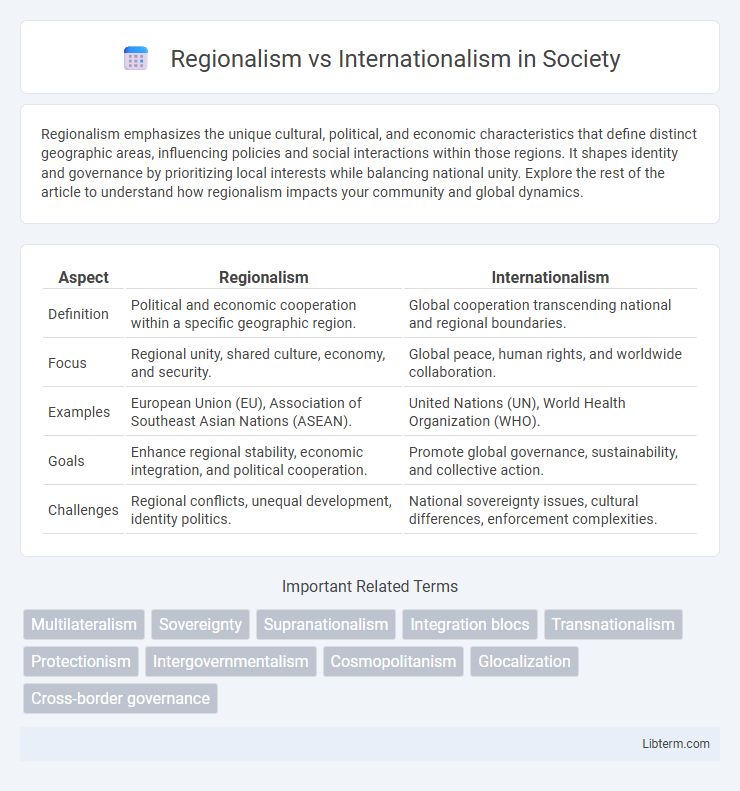Regionalism emphasizes the unique cultural, political, and economic characteristics that define distinct geographic areas, influencing policies and social interactions within those regions. It shapes identity and governance by prioritizing local interests while balancing national unity. Explore the rest of the article to understand how regionalism impacts your community and global dynamics.
Table of Comparison
| Aspect | Regionalism | Internationalism |
|---|---|---|
| Definition | Political and economic cooperation within a specific geographic region. | Global cooperation transcending national and regional boundaries. |
| Focus | Regional unity, shared culture, economy, and security. | Global peace, human rights, and worldwide collaboration. |
| Examples | European Union (EU), Association of Southeast Asian Nations (ASEAN). | United Nations (UN), World Health Organization (WHO). |
| Goals | Enhance regional stability, economic integration, and political cooperation. | Promote global governance, sustainability, and collective action. |
| Challenges | Regional conflicts, unequal development, identity politics. | National sovereignty issues, cultural differences, enforcement complexities. |
Introduction to Regionalism and Internationalism
Regionalism emphasizes cooperation among neighboring countries to enhance economic, political, and social integration, strengthening collective identity within a defined geographic area. Internationalism advocates for global collaboration beyond regional boundaries, promoting universal principles such as human rights, peace, and sustainable development across nations worldwide. Both concepts shape the dynamics of international relations but differ in their scope, priorities, and mechanisms of cooperation.
Historical Evolution of Regionalism
The historical evolution of regionalism traces back to post-World War II efforts aimed at promoting economic cooperation and political stability within specific geographic areas, exemplified by the formation of entities like the European Economic Community (EEC) in 1957. Regionalism has since expanded to include diverse forms such as free trade agreements, customs unions, and political unions that foster integration beyond national borders. This progression contrasts with internationalism, which emphasizes global cooperation through broader multilateral institutions like the United Nations and the World Trade Organization.
Origins and Growth of Internationalism
Internationalism originated in the late 19th century as a response to rising nationalism and regional conflicts, emphasizing cooperation beyond national borders to address global challenges. Key developments include the establishment of the League of Nations in 1919 and later the United Nations in 1945, promoting diplomatic dialogue and collective security. The growth of internationalism accelerated through multilateral institutions, treaties, and forums like the World Trade Organization and the Paris Agreement, which foster economic integration and global governance.
Key Differences Between Regionalism and Internationalism
Regionalism emphasizes political, economic, and cultural cooperation within a specific geographical area, fostering integration among neighboring countries to address common challenges and enhance regional stability. Internationalism advocates for global collaboration, promoting universal cooperation, peace, and the management of international issues beyond regional boundaries. The key differences lie in their scopes--regionalism is confined to a particular region, while internationalism seeks inclusive, worldwide partnerships and collective action.
Major Regional Organizations and Their Impact
Major regional organizations such as the European Union (EU), Association of Southeast Asian Nations (ASEAN), and African Union (AU) play a pivotal role in shaping political, economic, and security cooperation within their respective regions, promoting regional integration and collective decision-making. These organizations enhance regional stability, facilitate trade agreements, and address cross-border challenges through coordinated policies, which often complement global internationalist efforts led by institutions like the United Nations (UN) and World Trade Organization (WTO). The dynamic interplay between regionalism and internationalism demonstrates how regional bodies act as key actors in global governance by balancing localized interests with broader international objectives.
Prominent International Institutions and Their Roles
Prominent international institutions such as the United Nations (UN), World Trade Organization (WTO), and International Monetary Fund (IMF) play critical roles in promoting internationalism by fostering global cooperation, regulating trade, and providing financial stability. Regionalism, embodied by entities like the European Union (EU), Association of Southeast Asian Nations (ASEAN), and African Union (AU), focuses on regional integration to address specific geopolitical, economic, and social issues within a defined geographic area. These institutions collectively shape the balance between global governance and regional priorities, impacting international relations, security policies, and economic development frameworks worldwide.
Economic Implications of Regional vs. International Cooperation
Regionalism fosters economic integration through trade agreements that reduce tariffs and streamline regulations among neighboring countries, boosting intra-regional trade and investment. Internationalism promotes broader economic cooperation by encouraging multilateral agreements that enhance global market access and distribute economic benefits more widely. Balancing regional economic blocs with global economic frameworks shapes the dynamics of international trade, investment flows, and economic growth patterns.
Political and Security Dimensions: Regionalism vs. Internationalism
Regionalism emphasizes political and security cooperation within specific geographic areas, fostering collective identity and tailored responses to local challenges, while internationalism promotes global governance and multilateral institutions to address security threats transcending national borders. Political regionalism often leads to the formation of organizations like the European Union or ASEAN, which negotiate defense policies and conflict resolution mechanisms aligned with regional interests. Conversely, internationalism relies on entities such as the United Nations and NATO to coordinate broader security strategies and uphold international law across diverse states.
Challenges and Criticisms of Both Approaches
Regionalism faces challenges such as exclusionary practices and reinforcing economic disparities between member states, limiting broader global cooperation. Internationalism often struggles with issues of sovereignty, cultural differences, and enforcement of agreements, leading to slow decision-making and uneven power dynamics. Both approaches are criticized for sometimes prioritizing political or economic agendas over inclusive, equitable development and environmental sustainability.
Future Prospects: Finding Balance Between Regionalism and Internationalism
Future prospects in global governance emphasize the need to balance regionalism and internationalism, recognizing regional blocs like the EU and ASEAN as essential for addressing localized economic and political challenges. Simultaneously, strengthening international institutions such as the United Nations and WTO promotes global cooperation on transnational issues like climate change and trade. Achieving synergy between these approaches supports sustainable development and geopolitical stability in an increasingly interconnected world.
Regionalism Infographic

 libterm.com
libterm.com